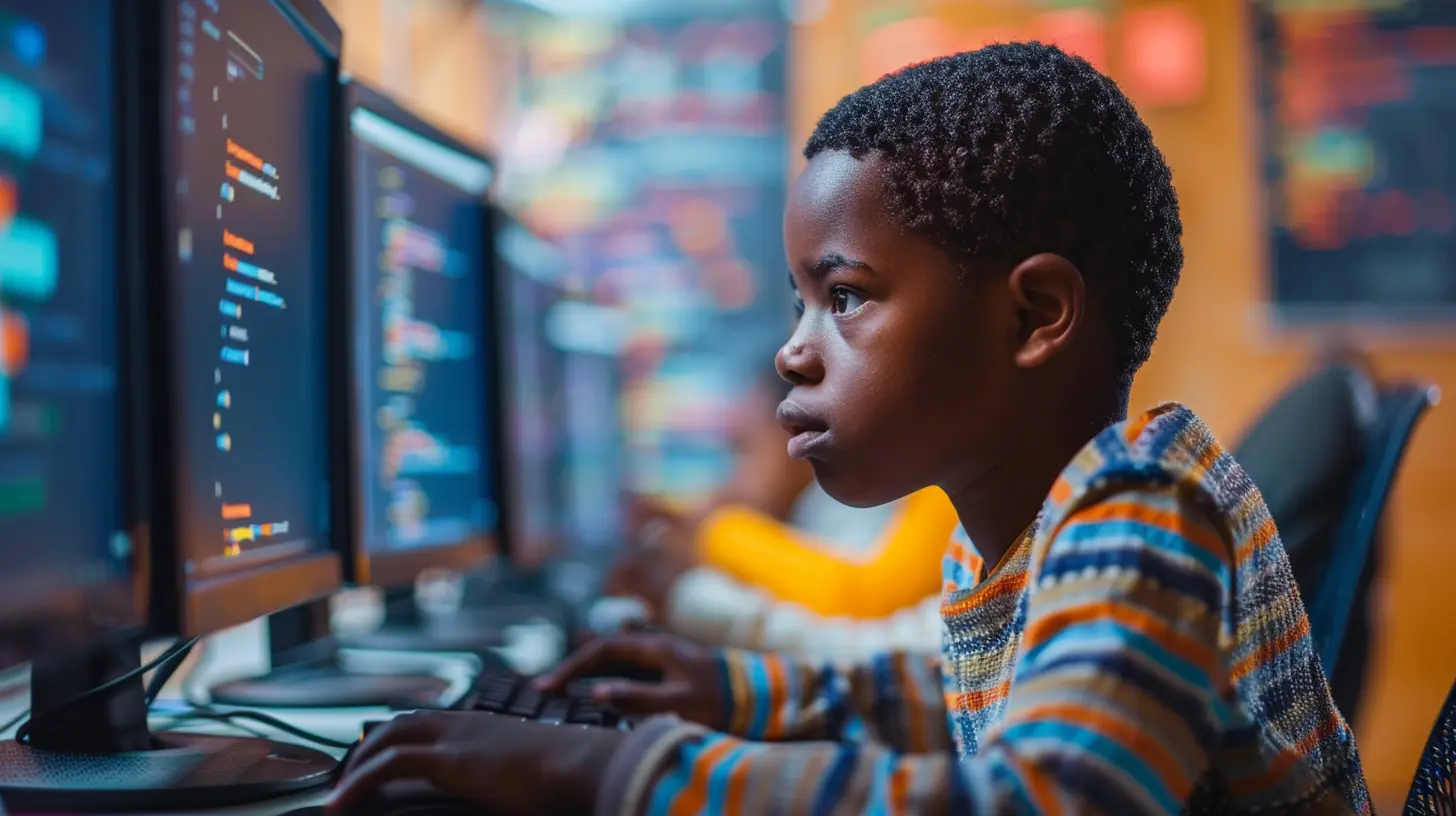7 June 2025
Let’s face it—technology is everywhere. From the smartphones in our pockets to the smart TVs in our living rooms, digital devices have become second nature. But here's the real question: are we preparing our children to be not just consumers of technology—but creators too?
That’s where the idea of coding curriculum in primary education comes in. And no, we’re not talking about turning every 9-year-old into a Silicon Valley prodigy. We’re talking about giving them the foundational skills to think logically, solve problems, and understand the tech-driven world they’re growing up in.

Why Start Teaching Coding in Primary School?
At first glance, teaching coding to young kids might seem a bit much. I mean, they’ve just learned how to tie their shoelaces, right? But believe it or not, the earlier they start, the better.Primary education is the perfect time to introduce coding because it's when kids are most curious, imaginative, and eager to experiment. Coding taps right into that creativity. It’s like giving them LEGO blocks—but instead of building castles, they’re building apps, games, and websites.
So, why not harness that energy and point it in the direction of a skill that could shape their future?

Coding Builds More Than Just Tech Skills
You might think coding is just about learning languages like Python, Scratch, or JavaScript. But it goes way beyond that. It teaches something way more valuable—how to think.Logical Thinking and Problem-Solving
When kids learn to code, they learn how to break big problems down into small, manageable steps—a skill that’s valuable in literally every area of life. Think about it: solving a math equation, organizing a group project, even deciding what outfit to wear on a cold day—they all require logical thinking.Programming helps train that part of the brain naturally.
Creativity and Innovation
Coding is not dry and robotic. It’s actually super creative. Kids can build games, design animations, create digital art, or even invent their own app ideas. It gives them a platform to express ideas in ways we never had growing up.It’s like giving them a magic wand, but with real-life applications.
Perseverance and Patience
Any coder will tell you: bugs happen. Programs crash. Things don’t always work on the first try. But that’s a good thing.Learning to code teaches kids resilience. They learn that mistakes are just stepping stones to success. They learn to test, tweak, and try again. That kind of grit? It’s golden.

Preparing for the Future Job Market
Let’s be real—tech isn't going anywhere. In fact, it's growing faster than we can keep up with.Growing Demand for Tech Skills
Jobs in tech are increasing, and those roles pay well. But even if your child doesn’t want to be a coder, the digital economy touches everything now. Marketing, healthcare, finance, education—you name it, and there’s a digital component.Having basic coding knowledge is like knowing how to read and write. It opens doors.
Leveling the Playing Field
Coding in schools helps bridge gaps. Everyone gets equal access regardless of their background. It’s not just for the kids whose parents can afford expensive coding bootcamps or private lessons. When it’s part of the school curriculum, everyone gets a shot.That’s how we create a more inclusive digital future.

Coding Is the New Literacy
Think about this—100 years ago, reading and writing were considered revolutionary skills. Today, coding is earning that same status.Understanding Digital Environments
Most kids are already immersed in digital worlds—playing games, watching videos, or chatting online. But understanding how those platforms work under the hood? That’s what coding allows.It's like showing them how the magic trick works—except, instead of ruining it, they get to create their own magic.
Communicating in a Digital Language
Coding is literally a language—a way to communicate with machines. And like any language, the earlier you learn it, the more fluent you become. Introducing it in primary school gives kids a head start.How Coding Enhances Other Areas of Learning
Here’s something awesome—coding doesn’t just help in computer science. It improves other subjects too.Boosts Math Skills
Coding and math go hand in hand. Kids start to recognize patterns, think in numbers, and understand sequencing—all core math concepts. And the fun part? They don’t even realize they’re learning math because they’re too busy making a robot dance or designing their own game.Improves Writing and Storytelling
When kids code a story-based game or animation, they need to plot a beginning, middle, and end. They create characters, arcs, and even dialogue. It’s like digital storytelling.So yes, coding can help with English class too!
Encourages Teamwork and Collaboration
Many coding projects involve group work. Kids learn to delegate tasks, bounce ideas off each other, and solve problems together. It’s teamwork with a tech twist.Addressing the Concerns: Is Coding Too Hard for Kids?
You might be thinking, “Okay, this all sounds great—but is it really doable for 7-year-olds?”Absolutely.
Age-Appropriate Tools and Platforms
There are tons of platforms designed just for kids—like Scratch, Tynker, or Code.org. They use visual blocks instead of complex syntax, making it as easy as dragging and dropping puzzle pieces.And the best part? It makes learning feel like playing.
Teachers Are Getting On Board Too
Don’t worry—kids aren’t doing this alone. More and more teachers are being trained to integrate coding into the classroom. In fact, many schools are starting to include coding in their lesson plans alongside math and science.It’s becoming part of the everyday educational experience.
Real-World Success Stories
Still need convincing? Let's talk real-life.Finland and Estonia Are Leading the Way
Countries like Finland and Estonia have already embedded coding into their national curriculum. And guess what? Students there aren’t just surviving—they’re thriving. These kids are coming up with innovative apps, competing in global tech competitions, and walking into high school with skills most adults are still trying to grasp.Tech Giants Are Supporting It
Major players like Google, Microsoft, and Apple are investing big bucks into early coding education. If that’s not a sign of where the future’s headed, I don’t know what is. They know that the sooner kids get exposed to programming, the better prepared they’ll be.How to Introduce Coding in Your School
So, how can schools or even parents start weaving coding into the primary curriculum? A few simple ideas can make a big difference.Start Small
You don’t need to overhaul the entire curriculum. Start with weekly coding sessions using beginner-friendly tools. Even 30 minutes a week can work wonders.Use Gamified Learning
Kids love games. Use that to your advantage. Platforms like Code.org and Scratch turn coding into a game-like experience, keeping engagement high and frustration low.Integrate With Other Subjects
Don’t treat coding as a stand-alone subject. Blend it into math, art, or science lessons. Let kids code a science experiment simulation or create digital art. Make it relevant, and they’ll stay interested.Encourage at Home Learning
Parents don’t have to be tech wizards. Just showing interest and encouraging kids to explore can go a long way. There are plenty of free apps and websites that make it easy to practice coding at home.Final Thoughts: It’s Time to Embrace Coding Early
We’re living in a world driven by technology. And like it or not, our kids are growing up in it. Equipping them with coding skills at an early age is not just smart—it’s essential.It’s like teaching them to ride a bike—but instead of pedaling down the street, they’re navigating the digital future.
So, whether you're a parent, teacher, or decision-maker, remember this: introducing coding in primary education isn’t about turning kids into programmers overnight. It’s about opening their minds, expanding their horizons, and preparing them for a future where understanding technology isn’t optional—it’s fundamental.
Ready to push start?









Calder King
Integrating a coding curriculum in primary education fosters critical thinking and creativity, equipping students with essential skills for the digital future.
December 22, 2025 at 8:23 PM